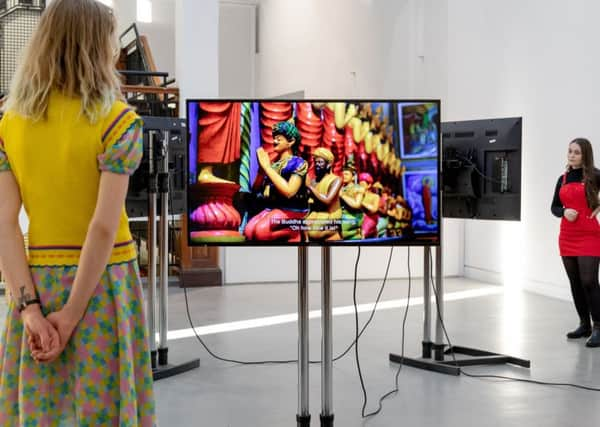Two hard-hitting new exhibitions are on display at the Tetley in Leeds connecting local and international stories.


One part of the powerful and moving dual exhibition currently at the Tetley is the culmination of a long-term collaboration.
The innovative contemporary arts space in south Leeds has been involved in the New North and South project, a three-year programme of activity across eleven arts organisations from the North of England and South Asia. As part of that, explains Tetley artistic director Bryony Bond, they have been working with the Colombo Biennale in Sri Lanka and they decided that together they would co-commission a work from a Sri Lankan artist. That piece, film installation The Tent by Kannan Arunasalam, forms the centrepiece of the show. “Kanann wrote a fantastic proposal to bring to light a little known story about Sri Lanka post the civil war,” says Bond. At the height of the conflict, which ravaged the country from 1983-2009, tens of thousands of people disappeared and Arunasalam’s moving work focuses on some of the wives and mothers of the missing.
Advertisement
Hide AdAdvertisement
Hide Ad“Kannan wanted to make a film about the disappearances and he had come across a group of women who had been protesting by setting up camp in front of the offices of the new government which had promised to get answers for the families but hadn’t. He wanted to explore their protest and the nature of their existence – he talks about them being caught between hope and grief.” The resulting 20-minute film is quietly and profoundly affecting. Arunasalam’s camera captures the still moments of the women’s vigil as they sit silently, make tea, read or sweep the floor.
It also features, by contrast, on a split screen, footage of the crowds and noise of media attention on an anniversary marking 500 days of consecutive protest. Arunasalam came to filmmaking through journalism and this is the first time his work has been shown in a gallery setting. “We wanted to take this opportunity to show the breadth of his work,” says Bond. “So we have also brought to the exhibition a series of other existing short films and portraits that convey the diversity and richness of Sri Lankan culture and identity.”
The second show is Rasheed Araeen’s For Oluwale II. Presented for the first time in Leeds in partnership with the charity Remember Oluwale, it marks the 50th anniversary of the death of David Oluwale, a British-Nigerian who drowned in the River Aire in April 1969 after being systematically harassed by members of the Leeds City Police force. “I was stunned that this show had never been to Leeds before,” says Bond. “It was originally made in 1971/72, reconfigured in 1975 and the version we are showing is another remake from 1988. Rasheed talks about the Oluwale story being a political awakening for him. Before that he says that he thought of art and politics as being separate.” The work comprises six photographic panels, plus clippings and further information about Oluwale alongside a letter of complaint from someone objecting to the display of the original work in the early 70s.
Neither of these exhibitions make for easy viewing, but that is precisely the point. The artists are addressing issues that are too often either overlooked or hidden away. “They are important stories to tell,” says Bond. “Both shows are digging beyond the headlines to explore identity and where the personal and political meet.”
Until June 2. Free entry.